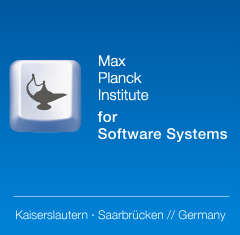Related Research Articles

The Max Planck Society for the Advancement of Science is a formally independent non-governmental and non-profit association of German research institutes. Founded in 1911 as the Kaiser Wilhelm Society, it was renamed to the Max Planck Society in 1948 in honor of its former president, theoretical physicist Max Planck. The society is funded by the federal and state governments of Germany.

The Kaiser Wilhelm Society for the Advancement of Science was a German scientific institution established in the German Empire in 1911. Its functions were taken over by the Max Planck Society. The Kaiser Wilhelm Society was an umbrella organisation for many institutes, testing stations, and research units created under its authority.

The Max Planck Institute for Mathematics is a research institute located in Bonn, Germany. It is named in honor of the German physicist Max Planck and forms part of the Max Planck Society (Max-Planck-Gesellschaft), an association of 84 institutes engaging in fundamental research in the arts and the sciences. The MPIM is the only Max Planck institute specializing in pure mathematics.

The Max-Planck-Institut für Astronomie is a research institute of the Max Planck Society (MPG). It is located in Heidelberg, Baden-Württemberg, Germany near the top of the Königstuhl, adjacent to the historic Landessternwarte Heidelberg-Königstuhl astronomical observatory. The institute primarily conducts basic research in the natural sciences in the field of astronomy.

Peter Gruss is a German developmental biologist, president of the Okinawa Institute of Science and Technology, and the former president of the Max-Planck-Gesellschaft.

The Max Planck Institute of Geoanthropology performs fundamental research into archaeological science. The institute is one of more than 80 research institutes of the Max Planck Society and is located in Jena, Germany.

The Frankfurt Institute for Advanced Studies (FIAS) is a private-public institution for basic theoretical research in various areas of science focusing on interdisciplinary research. It is located in Frankfurt am Main, Germany, at its own home at the Frankfurt-Riedberg campus of the Goethe University. It was founded in 2003.

The Max Planck Institute for Software Systems (MPI-SWS) is a computer science research institute co-located in Saarbrücken and Kaiserslautern, Germany. The institute is chartered to conduct basic research in all areas related to the design, analysis, modelling, implementation and evaluation of complex software systems. Particular areas of interest include programming systems, distributed and networked systems, embedded and autonomous systems, as well as crosscutting aspects like formal modelling and analysis of software systems, security, dependability and software engineering. It joins over 80 other institutes run by the Max-Planck-Gesellschaft, which conduct world-class basic research in medicine, biology, chemistry, physics, technology and the humanities.

The Max Planck Institute of Molecular Physiology is located in Dortmund, next to the Technical University of Dortmund. It is one of 80 institutes in the Max Planck Society.

The Max Planck Institute for Human Cognitive and Brain Sciences is located in Leipzig, Germany. The institute was founded in 2004 by a merger between the former Max Planck Institute of Cognitive Neuroscience in Leipzig and the Max Planck Institute for Psychological Research in Munich. It is one of 86 institutes in the Max Planck Society. Research at the Max Planck Institute for Human Cognitive and Brain Sciences revolves around human cognitive abilities and cerebral processes, with a focus on the neural basis of brain functions like language, emotions and human social behaviour, music and action.

The Max Planck Institute for Coal Research is an institute located in Mülheim an der Ruhr, Germany specializing in chemical research on catalysis. It is one of the 86 institutes in the Max Planck Society (Max-Planck-Gesellschaft). It was founded in 1912 in Mülheim an der Ruhr as the Kaiser Wilhelm Institute for Coal Research to study the chemistry and uses of coal, and became an independent Max Planck Institute in 1949.

Founded on 18 March 2011, the Max Planck Institute for Intelligent Systems (MPI-IS) is one of the 86 research institutes of the Max Planck Society. With locations in Stuttgart and Tübingen, it combines interdisciplinary research in the growing field of intelligent systems. Intelligent systems are becoming increasingly important in many areas of life – as virtual systems on the Internet or as cyber-physical systems in the physical world. Artificial intelligent systems can be used in a broad range of areas, for instance in autonomous vehicles or to diagnose and fight diseases.

The Max Planck Institute for the Science of Light (MPL) performs basic research in optical metrology, optical communication, new optical materials, plasmonics and nanophotonics and optical applications in biology and medicine. It is part of the Max Planck Society and was founded on January 1, 2009 in Erlangen near Nuremberg. The institute is based on the Max Planck Research Group "Optics, Information and Photonics", which was founded in 2004 at the University of Erlangen-Nuremberg, as a precursor. The institute currently comprises four divisions.

The Max Planck Institute for the Study of Crime, Security and Law is a non-university research institute located in Freiburg, Germany. The institute is part of the Max Planck Society and is conducting basic research into criminal law, criminology and public law.
Michael Backes is a German professor of computer science. He is the founding director and CEO of the CISPA Helmholtz Center for Information Security. He is known for his work on formal methods, cryptography and privacy-enhancing technologies.
ATHENE, formerly Center for Research in Security and Privacy (CRISP), is the national research center for IT security and privacy in Germany and the largest research center for IT security in Europe. The research center is located in Darmstadt and deals with key issues of IT security in the digitization of government, business and society.

The Department of Computer Science is a department of the Technische Universität Darmstadt. With a total of 36 professorships and about 3,700 students in 12 study courses, the Department of Computer Science is the largest department of the university. The department shapes the two research profile areas "Cybersecurity (CYSEC)" and "Internet and Digitization (InDi)" of the university.

Cha Meeyoung, sometimes known as Mia, is an associate professor at KAIST in the School of Computing and a chief investigator in the Pioneer Research Center for Mathematical and Computational Sciences at the Institute for Basic Science. Her research focuses on network and data science with an emphasis on modeling, analyzing complex information propagation processes, machine learning-based computational social science, and deep learning. In June 2024, she will become the scientific director of the Max Planck Institute for Security and Privacy. She has served on the editorial boards of the journals PeerJ and ACM Transactions on Social Computing.
Hellmut Friedrich Fischmeister was an Austrian metallurgist who was a pioneer in powder metallurgy.
References
- ↑ "Foundation of the Max Planck Institute for Cyber Security and Privacy". eCAPITAL. May 3, 2019.
- ↑ "Computer Science Research at Max Planck Institutes".
- ↑ 최지원 (10 January 2024). ""최고-최초-유일 중 하나는 해야"… 노벨상 사관학교 한국인 첫 단장". The Dong-a Ilbo (in Korean). Retrieved 10 January 2024.